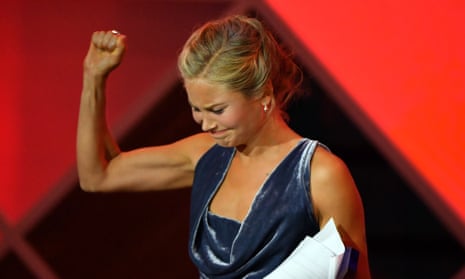A sexual assault survivor whose case led to the overturning of a Tasmanian law gagging her from speaking about her experiences of assault has been named Australian of the Year.
Grace Tame won a supreme court exemption in 2019 which allowed her to talk about how, as a 15-year-old, she was repeatedly sexually abused by her 58-year-old maths teacher.
Tasmania’s Evidence Act forbade sexual assault victims from speaking about their experiences, while media outlets and perpetrators were able to. Under the law, a Tasmanian newspaper was fined $20,000 for publishing the name of a rape victim in 2012, despite having her consent.
Tame’s case was a catalyst for the #LetHerSpeak campaign in Tasmania, which was created by journalist and sexual assault survivor Nina Funnell. The campaign – which also sought to overturn a similar gag clause in the Northern Territory – applied for the court order on Tame’s behalf.
Following her successful exemption, the laws were changed in 2020 which allowed victims in Tasmania to speak publicly.
Tame’s teacher, Nicolaas Bester, was convicted and jailed for molesting her, however he was able to speak freely to the media before the 2019 exemption when Tame had to be known by the pseudonym Jane Doe.
“The majority of men in Australia envy me,” Bester wrote on social media years earlier. “I was 59, she was 15 going on 25. It was awesome.”
"Hear me now." Tasmanian sexual assault survivor Grace Tame named 2021 #AustralianoftheYear https://t.co/8WaXQk1gvj #HearHerVoice #LetHerSpeak #AOTY pic.twitter.com/Y7cOQm8q6p
— Guardian Australia (@GuardianAus) January 25, 2021
Tame on Monday night said: “When we share, we heal.”
“Yes, discussion of child sexual abuse is uncomfortable but nothing is more uncomfortable than the abuse itself,” the 26-year-old said after receiving the award.
“Let us redirect this discomfort to where it belongs – at the feet of perpetrators of these crimes. Together, we can redefine what it means to be a survivor. Together, we can end child sexual abuse. Survivors, be proud, our voices are changing history.”
James Muecke, an eye surgeon who has dedicated his professional career to preventing blindness among the poorest people in the world, won the award in 2020.
In 2019, Richard Harris and Craig Challen, the two cave divers who helped in the dramatic rescue of 12 boys and their coach from a flooded Thai cave, were jointly named 2019 Australians of the year.
Dr Miriam-Rose Ungunmerr Baumann, an Aboriginal activist, educator and artist, was on Monday night named 2021 Senior Australian of the Year for her work with the Miriam-Rose Foundation, which aims to empower Indigenous youth through education, art, culture and opportunities.
Ungunmerr Baumann delivered a touching speech, calling for greater understanding of Indigenous communities and their challenges.
“For years, we have walked on a one-way street to learn the white people’s way. I’ve learnt to walk in two worlds and live in towns and cities, and even worked in them,” she said. “Now is the time for you to come closer to understand us and to understand how we live, and listen to what needs are in our communities.”
The Young Australian of the Year award went to Isobel Marshall, who along with her business partner, Eloise Hall, launched a range of pads and tampons to improve access to hygiene products for young women.
“Period poverty is real. It is still a major reason for inequality around the world. Periods should not be a barrier to education,” she said. “They should not cause shame. Menstrual products should be accessible, affordable, not a luxury or a choice.”
The Australia’s Local Hero gong went to migrant campaigner Rosemary Kariuki.
Kariuki immigrated to Australia in 1999, escaping tribal and family violence, and has since then worked to help other migrants and refugees settle in their new country.
“I was born in Kenya and came to Australia on my own. It hasn’t always been easy but I learned a lot. I now my experiences to help other female migrants and refugees achieve their full potential in this country.”
